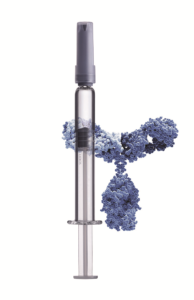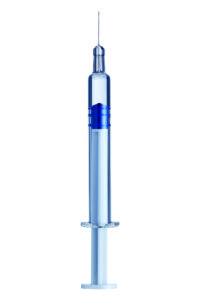Citation: Helbig C, “Finding the Right Packaging for Biologic Drugs”. ONdrugDelivery Magazine, Issue 105 (Feb 2020), pp 18-20.
Christian Helbig introduces a new 2.25 mL version of SCHOTT’s syriQ BioPure® prefillable syringes designed specifically for the biologics market and, developed in partnership with WL Gore, the world’s first silicone-free glass syringe system.

Figure 1: Biologics make up two-thirds of the development pipeline, yet their complex molecular structure and high viscosity require special packaging to maintain stability and ensure patient safety.
The pharmaceutical industry is witnessing a number of trends, which are increasingly influencing the development of new primary pharmaceutical packaging. One of these is the fast-growing market of biologics and another is the need to make the administration process as easy as possible for patients by enabling more convenient self-administration. Biologics currently account for around two-thirds of >3000 drugs in the development pipelines of international pharmaceutical companies (Figure 1). In fact, these novel types of drugs offer effective treatment options for a number of complex diseases such as cancer. At the same time, biologics have become even more structurally complex than their predecessors. Their molecular structure is more sensitive not only to temperature and other environmental conditions, but also to extractables and leachables (E&L) that can be released from primary packaging materials. E&L present a risk of drug/container interaction and can diminish a biologic’s purity and therapeutic effectiveness. As a result, the design of pharmaceutical containers for biologics is particularly challenging, as an innovative approach is required to ensure drug stability throughout the drug’s entire shelf life. Furthermore, biologic drugs are often highly viscous, which makes them more difficult to administer.
“syriQ BioPure® syringes come with a range of coated plunger stoppers tailored especially for sensitive applications. In fact, more than 48 different combinations featuring premium quality elastomer components have already been successfully tested and approved.”
The second trend highlighted here is more closely linked to patient comfort and improving their overall quality of life. In the past, biologics have been administered as intravenous (IV) or subcutaneous (SC) injections in clinics or hospitals. This meant that the patient had to visit a doctor every time a drug dose was needed. In order to improve the patient experience, there is a shift to move the administration to the patient’s home. While the option of self administration allows patients to continue their treatment more independently, it also means that injection systems must meet patients’ needs by ensuring a safe and easy administration process.
SCHOTT, an expert in the field of pharmaceutical primary packaging, has responded to these trends by launching syriQ BioPure®, prefillable glass syringes designed specifically for the biologics market. The new syringes keep sensitive drugs stable over their shelf lives, shorten time to market by providing a full documentation package for the combination product requirements, while making administration much easier for patients.
STATE-OF-THE-ART PACKAGING OF IMMENSE IMPORTANCE
syriQ BioPure® syringe barrels, the primary containers, are made of highly inert FIOLAX® borosilicate glass, the gold standard in the pharmaceutical industry since its development in 1911. Thanks to its strong track record, its suitability for use with sensitive drugs has been thoroughly researched. In addition, to ensure that tight geometrical tolerances are met for the syringes, each individual glass tube is subjected to thorough inspection using advanced technology.
“Together, SCHOTT and WL Gore have presented the first prefillable glass syringe (PFS) system that completely eliminates the need for silicone or similar substances when administering complex biologic drugs.”
As highly sensitive drugs are prone to interact with the container and components, the syriQ BioPure® manufacturing process has been further improved to reduce the amount of tungsten and adhesive residues as well as to ensure a uniform silicone layer. All features are validated and documented in accordance with the latest US FDA guidelines.
syriQ BioPure® syringes come with a range of coated plunger stoppers tailored especially for sensitive applications. In fact, more than 48 different combinations featuring premium quality elastomer components have already been successfully tested and approved. Options include various closure systems, such as Aptar 4800, Aptar 4900, West 7025 and West 7028. The use of high-end materials further contributes to the superior E&L profile of the glass syringes.
Furthermore, the syringes can be used with most of the leading safety and autoinjector devices, thus meeting market demand for products that can be administered at home for greater patient comfort. Seamless integration into these devices is achieved due to the syringes’ high dimensional accuracy. Additional dimensions that exceed ISO requirements and new geometrical tolerances are reached by employing cutting edge forming technology and by performing online inspections. This guarantees device compatibility by design and therefore leads to superior functionality in the patient experience.
syriQ BioPure® prefillable glass syringes are delivered pre-sterile in a standard nest and tub. The syringes can be filled on a wide variety of standard ready to use (RTU) filling lines and are easy to handle. Short time to market for the pharmaceutical industry is further supported as all required documentation is fully available.
The containers are available in both 1 mL long and 2.25 mL syringe formats – the latter being newly introduced to the market at Pharmapack 2020 (February 5-6, 2020 in Paris, France). This larger format was particularly developed for specific biologics, which are administered via autoinjectors.
Ensuring the efficiency of the treatment leads to an increase in the bioavailability, and therefore in a higher API concentration. This results in an increase of the viscosity of the API. The higher the viscosity, the more force is required to inject the drug, which may lead to the syringe breaking. Additionally, by nature, these large molecules in a high concentration can cause stability issues. In order to ensure an equally efficient treatment the glass syringe barrel has to be increased. While a standard 1 mL long glass syringe would be too small in volume for the increase in bioavailability, everything beyond 3 mL would be too big for a SC injection. Hence, a 2.25 mL glass syringe designed for these kinds of biologics is a suitable solution in terms of bioavailability and a SC injection to ensure the ease of administration and the efficiency of the treatment for the patient at the same time.
THE WORLD’S FIRST SILICONE-FREE GLASS SYRINGE SYSTEM
Within the biologic drug market, an estimated 10-15% of the pipeline are biologics that are highly sensitive to silicone. Silicone has long been a necessary substance for helping to reduce the injection force needed to administer drugs via prefilled syringes to make the treatment more comfortable for the patient. Nevertheless, there are cases in which silicone can interact with and even harm a drug. For this reason, pharmaceutical companies are also in need of more advanced types of syringes that avoid siliconisation of the syringe barrel while maintaining consistent gliding force through the highly accurate geometry of the container.

Figure 2: SCHOTT teamed up with WL Gore to introduce world’s first silicone-free glass syringe system, syriQ BioPure® silicone free.
SCHOTT has collaborated with the global material science company WL Gore to pair Gore’s ImproJect™ plungers with syriQ BioPure® silicone-free syringes (Figure 2). Together, SCHOTT and WL Gore (Newark, DE, US) have presented the first prefillable glass syringe (PFS) system that completely eliminates the need for silicone or similar substances when administering complexbiologic drugs. The two components create a unique silicone-free glass syringe system, which is the first of its kind in the world today, thus changing the ways in which biologics can be protected during filling, storage and up until the moment of administration.
While pharma companies previously chose to use vials instead of prefilled syringes to avoid silicone contamination, with syriQ BioPure® silicone-free syringes, a new class of drugs can now be manufactured and stored in prefillable syringes. This offers a way to save time for clinicians, reduce healthcare costs and improve safety for patients.
syriQ BioPure® silicone-free syringes use no silicone inside the syringe barrel. To maintain consistent gliding force and injection duration over the shelf life of the product, but also to provide robust container closure integrity, great emphasis was placed on accurate geometry. The new syringes are made of FIOLAX® CHR glass tubing – named in accordance with its controlled hydrolytic resistance – that is 100% inspected with the help of a big data process to ensure tight dimensions and the high cosmetic quality of each barrel. In addition, syriQ BioPure® silicone-free also features ultra-low tungsten residuals as well as low cannula adhesive residuals to lower the extractable profile and reduce the risk of container/drug interactions.
The barrels are offered with Gore ImproJect™ silicone-free plungers, an industry-leading silicone-free plunger, to further eliminate the risk of container interaction with sensitive biologics. Designed for use in bare-glass (nonsiliconised) barrels, these plungers help protect complex or sensitive biologics from silicone-induced aggregation and particulation while maintaining consistent injection performance over time.
This combined offering represents the only commercially available option for a silicone-free, prefilled syringe system (plunger and barrel) that protects sensitive biologics from potential interactions with silicone.
CONCLUSION
In summary, the rise of biologics presents an opportunity to treat numerous diseases, yet the structural complexity of molecules is simultaneously creating new complications when it comes to ensuring drug stability. Containers, moreover, need to support the trend towards self-administration by being compatible with autoinjectors and similar devices.
Innovations such as the extended syriQ BioPure® portfolio including the new 2.25 mL format and syriQ BioPure® silicone-free syringes offer solutions to ensure drug stability while enhancing the patient experience.

